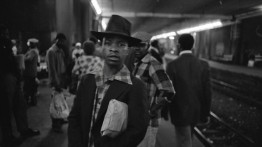COOPERMADE: Images of Life Under Apartheid

Jeanne Moutoussamy-Ashe
Waiting For Train to Soweto, 1977
South Africa collection
For five decades, the photography of Jeanne Moutoussamy-Ashe A'75 has captured unscripted moments from people’s lives. The artist’s unending curiosity about the relationship between landscape and citizen can be seen in images of African street vendors in Venice, basketball players on New York City courts, and Gullah descendants on Daufuskie Island, South Carolina.
Among these are Moutoussamy-Ashe’s photographs of South Africa taken during the 1970s in the midst of apartheid, which segregated and controlled the lives of Black South Africans. Having been raised on the south side of Chicago where her father was the first African American architect to build a high rise in that city, she is deeply familiar with the obstacles created by racism and segregation. Her images of life under the apartheid system are shot through with irony: a Black child holds a blond baby doll while a relative holds an infant in the courtyard of an indigent Soweto household; an elderly Black woman is tasked with checking township passbooks, the documents used to control Black people’s movements.
Moutoussamy-Ashe, who has work in the permanent collections of the Museum of Modern Art, the Schomburg Center, the National Museum of African American History and Culture the Whitney, and others, is currently working on a photographic autobiography.





